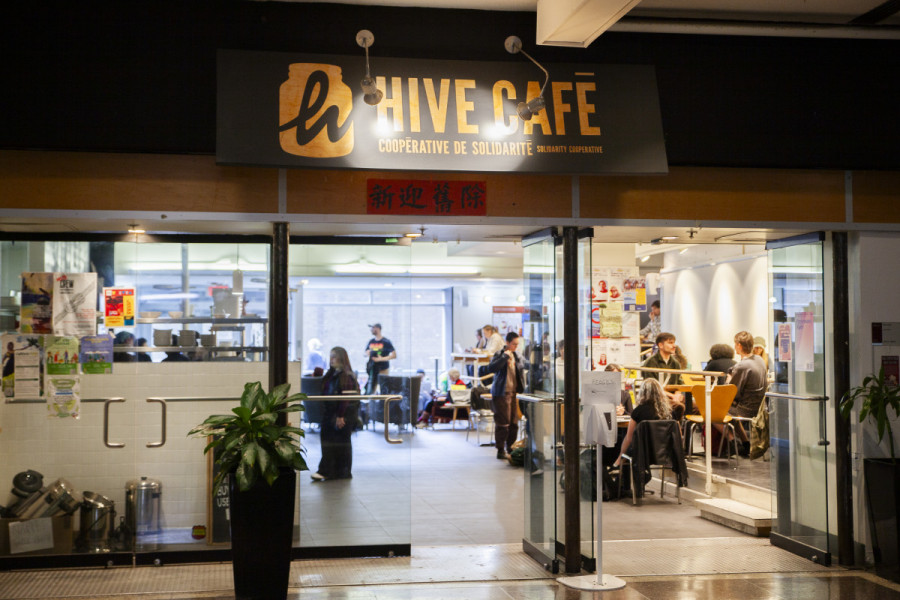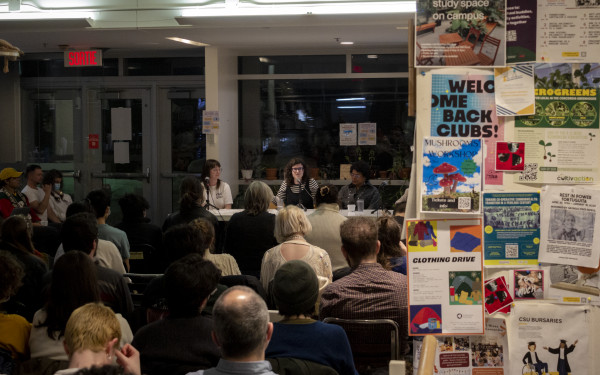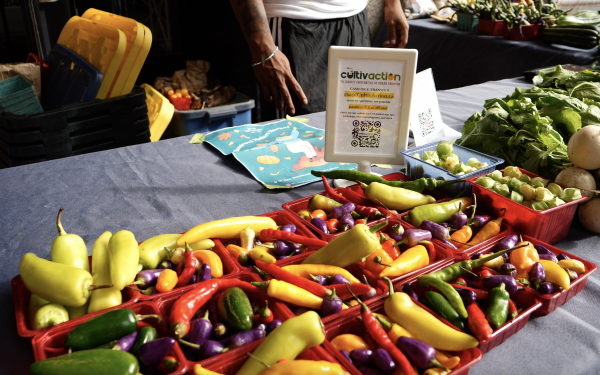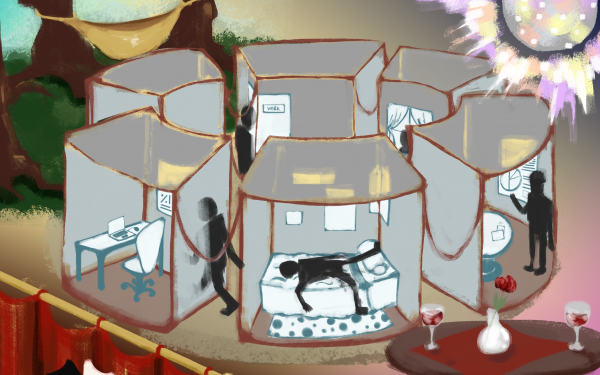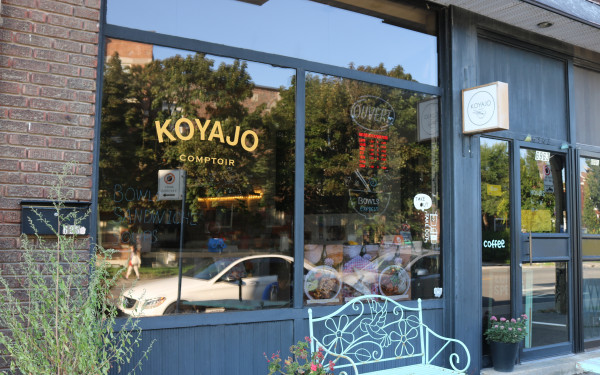The severe mismanagement of Concordia’s co-op café: The Hive
Administrative failures at Concordia’s student-run café has led to substantial debt and negative experiences for employees
Disclaimer: Emma, James, Lily, and Grace are individuals who are no longer affiliated with the Hive and have requested to go under a pseudonym and remain anonymous.
The Hive Café Solidarity Cooperative is a reprieve for many students for its study spots, offering sustainable food options and coffee. Yet, a stark contrast emerges from the accounts of former employees who describe a different side to the cafe. It includes allegations of unjust terminations, problematic interactions with HR, power imbalances in the structure of the co-op and finishing 2022 with a substantial deficit of $42,000.
Unwarranted termination
When the Hive reopened in Fall of 2022, James was appointed as the general coordinator of the Sir George Williams location. Calvin Clarke, the former general coordinator, was set to work at Loyola rather than both campuses as he had before. With James joining the co-op, both general coordinators would be working together, each with their own set of responsibilities. However, James says that he worked long hours as co-coordinator and had to fill in for baristas as a result of scheduling errors.
“In probably two weeks, I did 120 hours. I think I was doing 60 hours a week,” he says.
After James had gotten sick, and failed to schedule an important meeting with Clarke, he was fired by HR.
At the time, the HR position was held by Chloe Williams.
James believes Williams unilaterally made the decision to fire him with consent of the board, consisting of William’s friend who supported the termination and one other person who abstained.
“It's like the board had given Chloe a lot of discretion [...] When she fired me, I wasn't even in a room with other people. It was just me and Chloe," James says.
Clarke counters, explaining that the weekend before the Hive was set to reopen, James failed to show up. “He failed to give any fair notice about what was happening, did not provide any reasons for why he was not coming,” he says. “James failed to deliver on basic responsibilities he had to do.”
Those responsibilities included counting cash, organizing schedules, communicating with the team and ordering supplies.
“All of those things combined led up to this situation of both with myself, HR and other people that brought up their concerns and issues as well. The decision was made that James had to be let go,” Clarke says.
Clarke claims that he was supposed to leave last year, but had to remain in his position due to James’ sudden termination.
James' termination caused him “to be really depressed for a while. I couldn't think about going door to door and talking to people and giving out my CVs. It was so crushing. I remember calling [my partner] and just weeping into the phone.”
Contracts are renewed and canceled at the beginning and end of each semester. The rehiring of employees is based on anonymous performance reviews. Emma and Grace were not rehired as their feedback was negative. They both believe their reports are based on lies and speculation.
Relationship with HR
During her hiring process, Emma was informed to follow the Ministry of Agriculture, Fisheries and Food Quebec (MAPAQ) dress code. Their attire regulations when handling food include: wearing clean clothes, covering hair, removing jewelry; and short, clean and unpainted nails.
Emma states that while working in shorts, her coworkers, Clarke and Laure Brisson, were, “talking, laughing, looking at me. You can tell [when] someone's talking shit about you.” Later, Emma was approached by Brisson and told that it was a health and safety hazard to wear shorts in the kitchen. Emma describes that Brisson implied Clarke made sexual comments about her.
“If there was genuinely a health and safety issue, Calvin could have taken me aside privately and addressed me,” Emma says.
Emma decided to take the issue up with Williams, who held the HR position. Williams was in a relationship with Clarke, but Emma claims to not have known this at the time. “I reported to Calvin's girlfriend, unbeknownst to me.”
It took two months for Williams to respond to Emma, stating she was in violation of MAPAQ dress code.
Clarke classifies Emma’s complaint as “a false accusation” and that she was violating MAPAQ regulations. However, the provincial dress code includes no mention of shorts.
He clarified his relationship with Williams saying, “That was declared as a conflict of interest and Chloe resigned from HR when that came to be the case.”
“HR should be impartial. It shouldn't be your friend, never mind your girlfriend,” Emma says. “Of course she's going to take his side.”
Williams resigned in the new semester, and Lily, a previous board member, stepped into the position. The complaint was never resolved, however, as Lily also resigned soon after.
Clarke claims Williams stepped down before this situation was ever taken up with HR. However, The Link has seen the email correspondence between Emma and HR. HR’s emails were signed “Chloe on behalf of HR.”
Uncertainty regarding conflict resolution was brought up multiple times according to James. “The way they've organized their accountability structure is woefully inadequate for any situation. I'm not confident in the Hive’s structural ability to deal with almost any internal conflict,” he says.
Monopolizing power
The close friendship of those who held board member and coordinator roles concerned Emma. “It's like all these [people] that have never left Concordia are all in this weird friend cesspool of dating each other and being friends,” she explains.
Lily shares the same sentiment, “I think it definitely contributed to some unfair power dynamics. I don't know if I want to go as far as saying unfair treatment of employees, but it definitely had an effect on how the work was being done and how decisions were being made,” she explains.
Emma also believes that there was an obvious power dynamic held by Clarke and his friends.“Whenever they get called out, they're like, ‘I’m not your boss. I'm your equal. We’re on the same level.’ But you're not,” she says. "You obviously have some sort of authority over me.”
“Calvin was kind of like a hawk. People just didn't feel empowered. So, there's a level of discomfort. Instead of uplifting, it felt condescending. It felt like it was judgment,” Grace says.
Grace feels the same whenever Williams was present, saying that she, “was very judgmental. She wasn't at ease. She was very stressed at that time and it got projected onto us that we were not working hard enough.”
Grace adds that the crew of friends who have taken over the Hive need to pass it forward to other employees.
Clarke believes that claims of power imbalances are unfounded. “There are multiple people sitting around the table and there are multiple other opportunities for people to speak and voice their concerns and opinions,” he says. “I myself took it as my responsibility as a coordinator to give the floor to the baristas to express their concerns, their fears [and] their opinions.”
Clarke also defends himself, explaining that he took initiatives to better involve the baristas with labour council meetings, cooperative training opportunities, and also by offering them involvement on committees as well as financial training.
He adds that sharing institutional knowledge can be difficult due to high turnover every year. “It becomes very difficult to do that in a vacuum that is the Hive in a university environment.”
Grace shares that she offered to take on more responsibilities, such as counting tips and meal prepping. “Their response was non-communicative. It would be turning their head away from me and nodding because they didn't want me to.” She says there needs to be “an opening for people to step up and share [...] Allowing their voices to be heard.”
In May 2023, Clarke stepped down from his position as general coordinator and is currently resigning from the board.
Financial trouble
According to the most recent 2022 financial report, the Hive had a deficit of around $42,000. Their accumulation of profits by the end of the year was around $72,000.
Ronika Khanna, accountant and founder of Montreal Financial, explains, “they actually have a positive amount of $72,000. However, a lot of that money is coming from grants.”
In 2022, the Hive received around $124,000 in grants from the Concordia Student Union, Arts and Science Federation of Associations and Graduate Students' Association, two of which are specifically for their free lunch services.
Khanna stresses, “they have a gross margin of approximately $61,000. The question I would want to know, as an accountant, is why are they paying $170,000 worth of salaries?”
Extremely high salaries alongside lower gross margins could also be found in 2018 and 2019. In the latter year, they had $208,000 in gross margins, but $367,000 in expenses, $290,000 of which are only salaries. “It really stands out,” Khanna says.
“They're able to make up for their shortfall; their expenses being much higher than their revenues. Their regular operating expenses are higher than their gross margin, therefore, they need grants to survive,” Khanna says.
Malcolm McClintock, treasurer of the Hive, argues they are not operating the cafe like for-profit businesses do. “Our labor margin last year was egregiously off market standards, but that's part of the Hive's overall operation. It's meant to be subsidized for the students, so they have immediate access to more affordable food.”
McClintock says that during the 2022 Annual General Meeting, “a wage increase for the coordinators as well as baristas across the board [was] predicated on the understanding that certain sales targets would be met. The idea was that if we sell so much, we're able to afford these increased wages and benefit our worker members.”
He added that if the wage increases were deemed financially unsustainable and sales targets are not met, they would then need to reevaluate the labour costs.
“We ended up dipping far into the negative,” McClintock says. “Unfortunately, the systems were not very good at catching things in the moment. They were not proficient at tracking their labor costs on a regular basis. It would only happen at the end of the year.
As a result, McClintock and other members of the finance committee came up with a plan to institute sustainable systems to track the café’s finances; it included a wage cut.
McClintock adds that weekly financial health meetings have been implemented to report on three key metrics: labor, sales and cost of goods sold. “By doing that on a weekly basis, we can track how close to or off our budget is overall,” he says.
McClintock shares that one of the Hive’s current goals is to make finances more transparent. “I personally have seen some friction, and a little bit of animosity between the baristas and the board because the board makes macro level decisions and baristas, who are actually doing the labor on the floor, often feel like they're not consulted with.”
"I truly believe in the Hive," James says. He argues that if implemented correctly, "Concordia food systems would be really valuable."
The Link has attempted to reach out to Williams and Brisson on multiple occasions but received no response.
This article originally appeared in Volume 44, Issue 4, published October 17, 2023.

